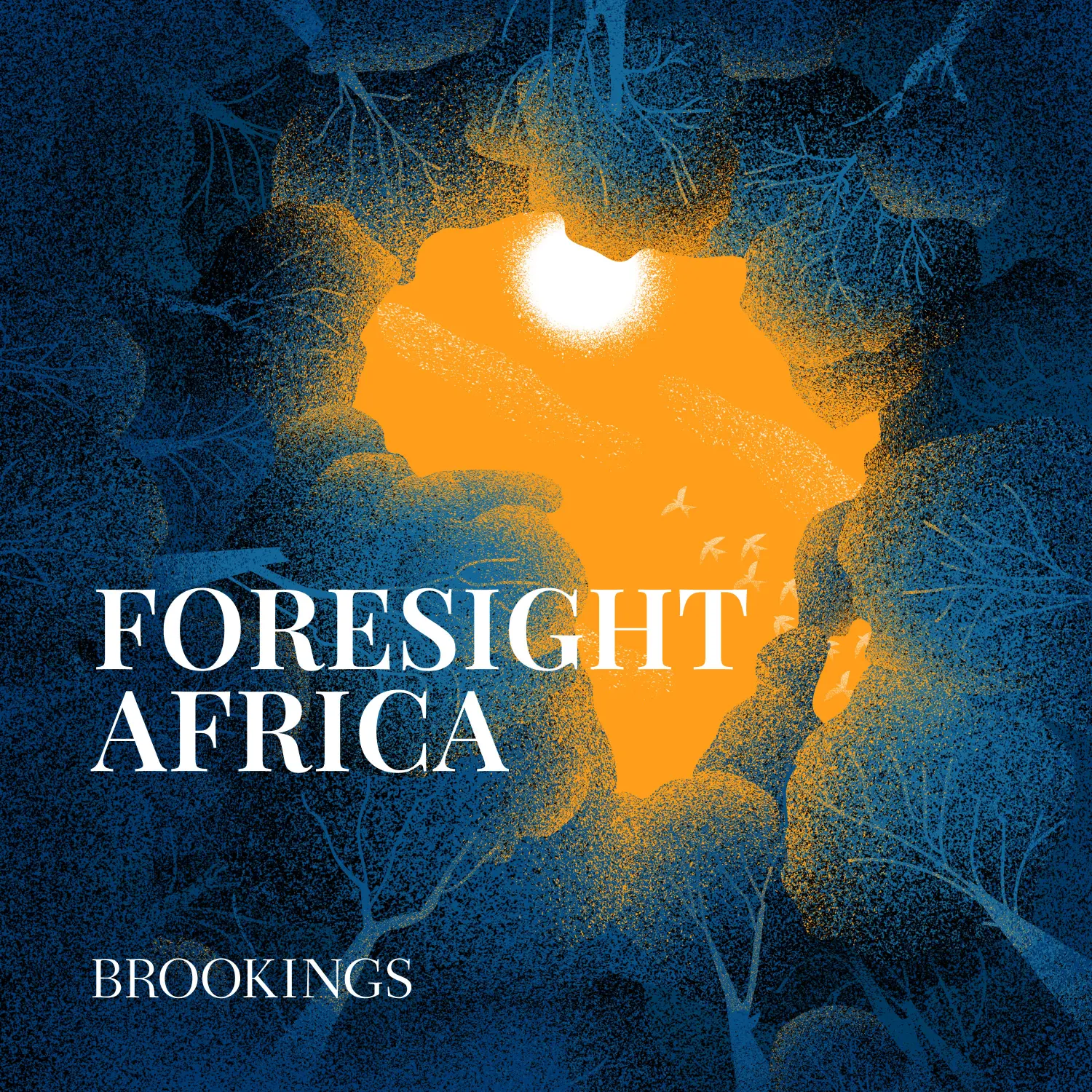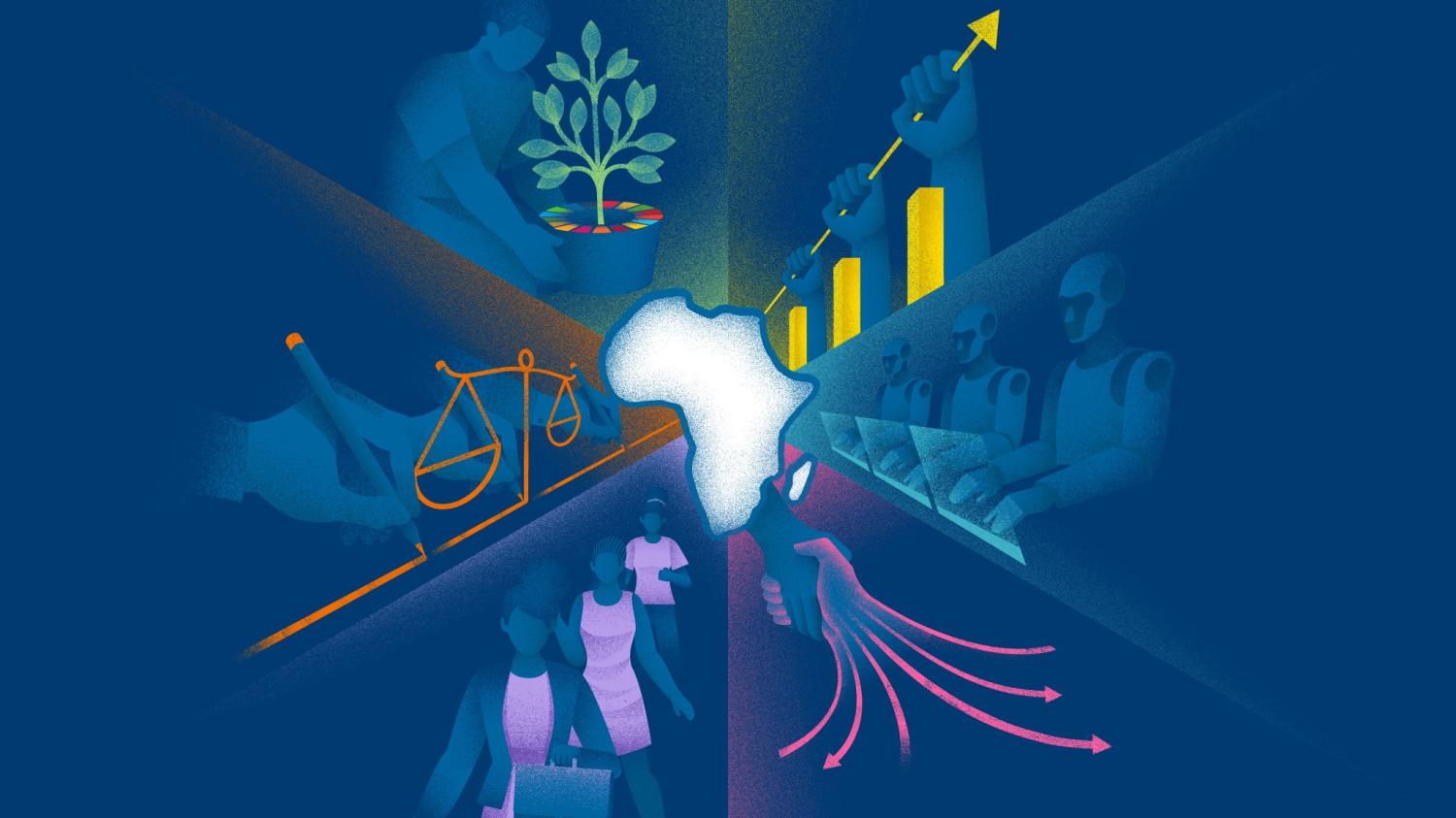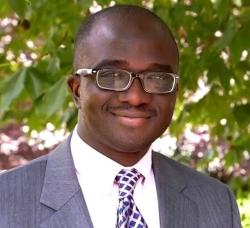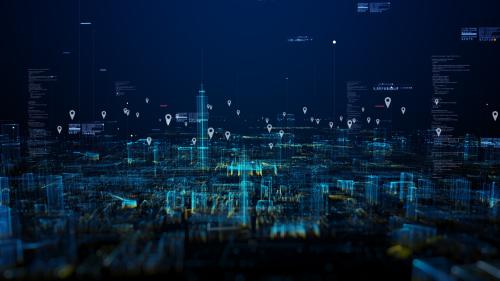Host Landry Signé speaks with Ibrahima Guimba-Saidou, CEO of the Partnership for Digital Access in Africa and former minister special advisor to the president of Niger, on the importance of expanding internet access in Africa and the potential of public-private partnerships to provide needed investments.
- Subscribe to Foresight Africa on Apple, Spotify, Afripods, or wherever you listen to podcasts.
- Listen to previous episodes.
- Watch episodes on YouTube.
- Learn about other Brookings podcasts from the Brookings Podcast Network.
- Sign up for the podcasts newsletter for occasional updates on featured episodes and new shows.
- Send feedback to [email protected].
Transcript
[music]
SIGNÉ: Hello, I am Landry Signé, senior fellow in the Global Economy and Development Program and the Africa Growth Initiative at the Brookings Institution. Welcome to the Foresight Africa podcast, where I engage with distinguished leaders in policy, business, academia, and civil society who share their unique insights and innovative solutions to Africa’s challenges while highlighting opportunities to advance engagement between Africa, the U.S., and the global community. You can learn more about this show and our work at Brookins dot edu slash Foresight Africa podcast.
My guest today is Ibrahima Guimba-Saidou, CEO of the Partnership for Digital Access in Africa, PDAA, a partnership of public and private actors in Africa and the United States with the goal of increasing internet access in Africa to 1 billion people by 2030.
Mr. Guimba-Saidou has worked for many years on issues of digital access and information in Africa. He was minister special advisor to the president of Niger, head of the country’s National Agency of Information Society, and a board member of Niger Telecom, Niger’s national operator. He has also served on the board of Ecobank Niger and the UN Geneva’s Beyond Lab.
Thank you for joining us today, Ibrahima.
GUIMBA-SAIDU: Thank you, Landry, it’s a pleasure being here. Thank you again for the kind invitation.
SIGNÉ: It’s a pleasure to have you on the show. You have had a very impressive career working on digital inclusion in Africa. In addition to the roles that I listed earlier, you have also worked with UNICEF, the World Economic Forum, and many more organizations on this important topic. What made you get involved in this field of work?
[2:59]
GUIMBA-SAIDU: I was going to say that I was raised maybe for this. I was really raised to care about people. I was raised to be involved in my community. I was raised to build bridges. And this has been for as long as I can remember in my mind. I feel like being one of the luckiest person, I want to say on the planet but close to. Being born in a country like Niger, by two highly educated parents at the time when literacy rate was around 2 or 3%, it was already a sign. Imagine.
And my dad was the first telecom engineer of the country. My mom was one of the first midwives, then became a doctor. And it is from that upbringing, the sense of community, the sense of curiosity, the sense of dreaming, dreaming big, and then the sense of really taking advantage of any opportunities that come around.
For me, it has been like really moving from the desert to the sky. Literally. I was born in a desert in Agadez in the northern part of Niger and ended up being a satellite engineer. My dream was to be an astronaut. And I guess I get closer by being in the satellite industry.
But really being so fortunate, I think for me, has reinforced that desire to be in this kind of environment and to be in a position where I today where I could participate in a broader effort to make, or contribute to make, the world a better place to live, to bring communities together, to bring partners together.
You mentioned that PDAA is a public-private partnership, so that’s almost for me it’s, like, in my DNA. All the my previous experience that you have indicated really reflect that. I worked for both private sector international organization and then governments. And I have seen really how those two parts could work together, could align, could have that multiply effect that we want, one plus one being greater than two
SIGNÉ: Fabulous! In 2024, 38% of Africans have access to internet, compared with 91% for Europe, 87% for the Americas, and 66% for Asia-Pacific. Most of our listeners understand the importance of broadband access in the modern world, but can you speak about some of the impacts of limited access to internet for African countries, including some that may not be obvious to casual observers? Why is access to broadband so vital for people on the continent?
[6:26]
GUIMBA-SAIDU: The reality is stark when you look at Africa’s connectivity statistic compared to other continents. In my home country, Niger, we only had one doctor per 23,000 inhabitants. Telemedicine could literally save lives, but it requires connectivity.
Remember during my time in Niger, when we started the Smart Village program, a young man was almost going to get his hand amputated if it wasn’t of the telemedicine platform that was installed through the then pilot that we were running. A dermatologist in Europe was able to diagnose from a distance, you know, the condition that he had. And then few weeks later, this person was completely cured.
So that’s how vital that is. Reliable internet is so vital because it changes everything. It also unlocks economic opportunities and essential services once out of reach, accelerating, for example, every dimension of our country’s economic and human development. That’s what broadband connectivity means for the continent.
I can remember also during the COVID era, if it wasn’t because of connectivity, imagine how disastrous the situation would’ve even been. In a country like Niger, despite the challenges that we had, but we were able to optimize that connectivity and better manage that situation.
Again, to give you some example. Still on the Smart Village program that we launched, because for us it was from the very beginning we really understood how we could fully take advantage of technology. There was this village called Fachi that is in the middle of the desert about close to over 2000 kilometers from the capital city, which we connected in 2018, if I’m not mistaken. Yes, 2018. And I’ve seen mothers really with tears because they haven’t been able to talk to their children in some cases for even decades. So when that connectivity was made available, they spent whole nights. It was really, so beautiful to see the energy that it unleashed in that community.
So, absolutely internet is vital. More so on the continent than elsewhere because of just a few example that I gave. But the list can go on and on.
SIGNÉ: Yeah, I see, that is a very fabulous example of success that you share. And along those lines, what kinds of policies or interventions are needed to expand digital inclusion in Africa?
[9:32]
GUIMBA-SAIDU: Listen, one of the challenges that we face on the continent for now is that Africa is fragmented. So one way of leveraging what technology offers us from the policy perspective is really to create that sort of collaboration that we can have to make the market a much bigger one so that initiatives, like the one that I indicated, or even better, you may recall M-PESA, which was very innovative. Imagine if the continent was less fragmented how this initiative, which was unique, which actually was really pure leapfrogging, would have had on the continent.
So for me it’s about creating that sort of large marketplace or environment through policies to facilitate trade, exchange of information among the different markets that we have on the continent.
And that’s also what PDAA is about really. By having that convening platform, by bringing public and private partners together, we are creating that what I like to call carpooling to create synergy among the different partners, and then create the virtual economy of scale. That could help accelerate most of those great ideas, make them economically viable.
And then also, this is very much aligned with Africa Agenda 2063. It’s just going to, in my view, help accelerate our vision on the continent to have a single market at some point.
So policy should help do that. Policy should facilitate the trade between all those parties. Imagine the economical impacts or social impact that will derive from having one billion people connected to the internet in Africa by 2030. Just picture that, and that’s the mission that we’re trying to deliver.
SIGNÉ: This will be incredible, Ibrahima. As I discuss in my book, Africa’s Fourth Industrial Revolution, African countries have been able to leapfrog over many legacy technologies to go straight into innovations, for example, by skipping landlines to go straight into mobile phones or being early adopters of digital payment systems. You mentioned M-PESA. Are there opportunities for this kind of leapfrogging when developing Africa’s physical and digital infrastructure to unlock access to high speed and internet, and how does PDAA support such opportunities or the broader policy interventions?
[12:28]
GUIMBA-SAIDU: No, absolutely. And by the way, congratulations for the book and also really for the insight. You nail, I think, the really those very critical points.
SIGNÉ: Thank you so much, Ibrahima.
GUIMBA-SAIDU: You’re welcome. So, absolutely. I mean, listen, Africa has done it before and now Africa has again the opportunity to show the world what it is made of. So take for example, connectivity. Because Africa doesn’t have a legacy system, so we could leverage satellites and high altitude platforms to leapfrog, to really bringing broadband to remote areas across the continent. So that’s a way where the continent is going to leapfrog, because that will bypass, for a certain period of time at least, fiber backbones, which take time to lay down. That’s one.
You can also look at maybe decentralized solar power and micro networks. Combining, for example, mini grids with local wireless networks or Wi-Fi hotspots to provide both energy, internet connectivity simultaneously, and again in the rural areas in particular where by the way most of the population lives.
And then that way you can make those system, deploy them in a very economic, sound way and be able to sustain that. So that’s a way, you know, to leapfrog the need really for national grid or centralized ISPs, for example.
You can also have open access and share network infrastructure. Right? Again, imagine open access fiber towers, data centers. You can drastically cut the costs and increase last mile access by combining all those, because today in most part of the world, they are dealt with in silos. So that’s what actually Africa can help transform.
Last but not least, it’s around localized data hosting and edge computing. Because of the way the technology is evolving also you have now an opportunity to hosting data within African borders, which is going to reduce latency, cost, and reliance on expensive international bandwidth. So, as you can see, Africa has again the opportunity not only to leapfrog, but to really shape the way technology could have a big impact both economically and socially on people.
SIGNÉ: Amazing. I really love the enthusiastic, optimistic look at the opportunities that we have on the continent with the very specific example, Ibrahima.
[15:10]
GUIMBA-SAIDU: Yeah. I mean, listen, the enthusiasm has to be there because we can really see how vibrant the continent is actually, and the world even, because of all the bridges that are being built with the continent.
But having had the opportunity to serve on the ground, I’m even more opportunistic because I have seen how, with little resources, transformation happened. So now when we have the opportunity to work in a better format by bringing, as I indicated earlier again, public and private partners and from different horizons, sky is the limit, and one has to be very enthusiastic about that.
SIGNÉ: Fabulous! African countries have some of the most expensive internet in the world, especially when cost relative to internet speed is considered. What accounts for this challenge and how have organizations like PDAA been working to address it?
[16:19]
GUIMBA-SAIDU: I mentioned it a bit earlier. It’s, one, the continent is fragmented, so you do not have the economy of scale. You have limited infrastructure today, fragmented market, again, that make it difficult, and countries are looking at things from only their own perspective. That’s where PDAA actually can help because we are creating, I indicated earlier, a carpooling approach, combining, let’s say, demand and supply and create a virtual economy of scale. So that is going to have an impact not only on cost and pricing, but also on the quality of the network and on the relevance of those network.
I’ll give you an example which we are working on. It’s a bulk purchase marketplace initiative, which is developed with one of our partners, Smart Africa, that demonstrates how multinational collaboration could reduce infrastructure and device costs through large scale procurement, for example. Today about 16 countries have already signed up for this approach —
SIGNÉ: — fabulous!
GUIMBA-SAIDU: — which we are going to initially focus on some of the usage specific uses like in the health sector as well as in education.
SIGNÉ: This is fantastic! In this year’s issue of Foresight Africa, I authored a chapter entitled “Leveraging AI and Emerging Technology To Unlock Africa’s Potential.” The chapter discuss how these advances can bridge gaps in achieving the Sustainable Development Goals. Given your work in the public and private sectors in Niger, do you see potential for AI to support development in Niger and other African countries?
[18:24]
GUIMBA-SAIDU: Absolutely. And again, I think, in your different publication, you touch really at the right points. AI is incredible. One thing that I would like to say, I mean, you have to embrace change. You have to embrace technology, because you cannot go against that for one. And definitely yes, AI has an immense potential to support development in countries like Niger and other African countries.
It can be seen as a transformational tool really for those countries. But, but, but only if deployed with intention, inclusivity, and alignment with national development goals. The narrative must shift from AI as a luxury to AI as a force multiplier for human development in fragile contexts. AI can boost tremendously sectors like agriculture, the productivity could increase significantly; in education access and learning quality. Again, on the continent, not only in Niger but in many countries, the ratio of teachers to learners is not what it should be. I’m not even talking about the quality. Healthcare and disease surveillance. I gave you the example of Niger: one doctor per 23,000 inhabitants. Africa, it’s one doctor per 8,000 inhabitants. So you see there the challenge. When you leverage AI, then you can augment that. You can have virtual doctors.
And also on public service delivery, which today is lacking. It’s not because of that the government don’t want to do that across the continent, but it is the resources that are lacking. AI can facilitate that.
[20:15]
And last but not least, it’s about job creation through AI-enabled ecosystems. Africa will have by 2030 about 230 million jobs that will need technology. And by 2050, 40% of the youth will be in Africa. I mean, it’s all about really job creation. It’s about creating opportunities. And AI can absolutely help do that.
And AI is central to what we do at PDAA. Really, it sits across the three pillars that we have. In access you leverage AI to have to not only deploy network in the most efficient way, but also to really create the dynamic spectrum management that you need to reach underserved areas, for example.
Same thing around the supply chain logistics. When you leverage AI, that also creates some value for you. And on digital scaling, which I just mentioned. So all those three are really central to what PDAA mission is about.
I’ll like to maybe say one more thing on this topic. Is that although we recognize the benefits, really that can only be realized with appropriate guardrails around data privacy, for example, ethics, and local capacity building. So that’s why, again, PDAA with our different partners, we focus on working to ensure a responsible deployment of AI across the continent.
SIGNÉ: Fantastic! I really like how you combine the imperative of seizing the phenomenal potential while balancing with minimizing the risk. I always like to end each interview by asking the guest two questions. First, building on your work and experience, what is one piece of advice you’ll give to African or global policymakers to ensure the best outcomes on the continent?
[22:36]
GUIMBA-SAIDU: Listen, if I may, a few things. I mean, first we need to recognize that they are doing a tremendous job already, which is not easy. The advice if I could would be to flag again that the work cannot be done alone. There need to be collaboration across borders, across sectors. For me, that’s important. It’s collaboration, collaboration, collaboration.
The second thing is also really to encourage and even boost public-private partnership. That’s important in my view. You can then bring the best of the two words to advance progress in the various countries. That’s why convening platform like PDAA are bringing value.
Last point maybe to emphasize that, again, I see the public sector and the private sector are literally being the two side of the same coin. So that’s why I think from the policy perspective, it’s important to have that perspective.
SIGNÉ: Fantastic! Second, given your successful career and impact, what advice would you give to youth hoping to follow in your footsteps?
[24:00]
GUIMBA-SAIDU: I’ll start by maybe what I believe is the most important thing, is integrity. Integrity is absolutely crucial. That’s the most important assets, and one should never compromise on that.
The second thing is to be curious, to dream big and actually be even scared by your dreams. That means they’re big enough and then that could keep you engaged.
You also have to ask questions, because it’s a learning journey. Even when you think that you know the answer or even when you know the answer, ask questions that will give you another perspective.
Work harder, as hard only is not enough. Work smarter. And be aware of the opportunities surrounding you. Look for leapfrogging opportunities all the time.
Last few points. Contribute to your community. You’re not alone. You shouldn’t be alone. You need to collaborate. You need to share knowledge and resources because we can learn from each other, and we should lift each other up in order for us to progress.
SIGNÉ: What a beautiful way to conclude, Ibrahima. Thank you so much for joining me today.
GUIMBA-SAIDU: Thank you so much, Landry, for giving me the opportunity. It’s a pleasure and I would like again to commend the work that you’re doing, you and your partners and colleagues at the institution.
[music]
It’s a pleasure to be associated with that. Thank you very much.
SIGNÉ: Thank you.
SIGNÉ: I am Landry Signé, and this has been Foresight Africa. Thank you, listeners, for joining me today.
The Foresight Africa podcast is brought to you by the Brookings Podcast Network. Send your feedback and questions to podcasts at Brookings dot edu. My special thanks to the production team including Fred Dews, producer; Nichole Grossman, Dafe Oputu, and Nicole Ntungire, associate producers; Gastón Reboredo, audio engineer; and Izzy Taylor, senior communications coordinator in Brookings Global.
The show’s art was designed by Shavanthi Mendis. Additional promotional support for this podcast comes from my colleagues in Brookings Global and the Office of Communications at Brookings.
The Brookings Institution is committed to quality, independence, and impact.
We are supported by a diverse array of funders. In line with our values and policies, each Brookings publication represents the sole views of its author(s).









Commentary
PodcastAdvancing digital inclusion in Africa
Listen on
Foresight Africa Podcast
August 20, 2025